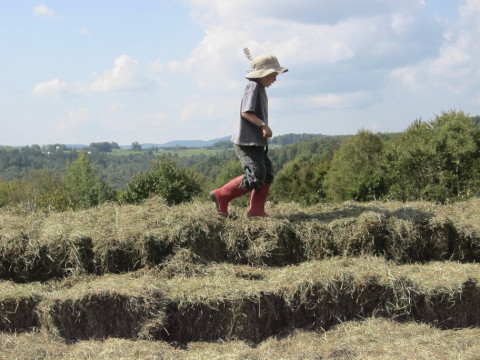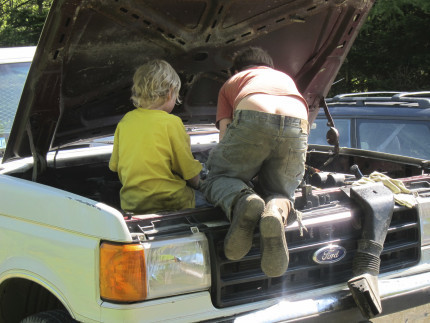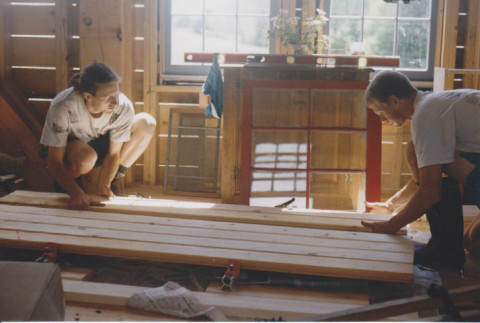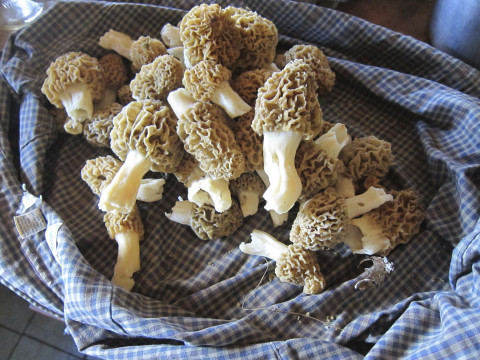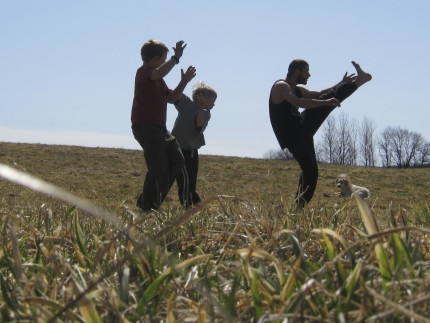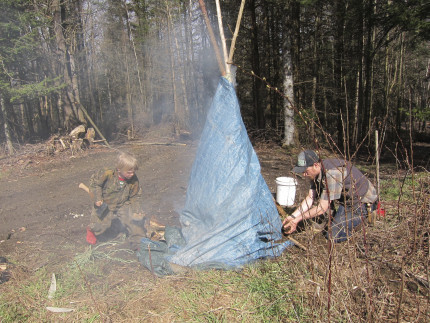Ben Hewitt's Blog, page 77
June 26, 2012
What Now?
The current stretch of rainy weather has been most welcome; after nearly two weeks of perfect haying weather, things were starting to feel a bit dry, and the relief we felt as the first drops starting pinging against the tin roof above our bedroom was like exhaling a breath held two beats too long. I’ve been moving the cows to fresh pasture twice daily, and legs of all my pants are soaked from pushing through the tall grass. I don’t even bother to change anymore, and have become accustomed to the clamminess of wet denim against skin.
I suppose we are pushing hard right now, although motivation and energy levels are high enough that it doesn’t really feel like it. The list of daily chores is long and multi-faceted: Feed and water the pigs, the meat birds, and the layers. Move the sheep to fresh pasture, then the cows. Bottle feed Pip, our two-week-old heifer that Penny is intent on training to pull. Milk. Tend the gardens. In between, fell trees and mill lumber, find and haul foundation stones for the new barn. Finish splitting firewood for the coming winter. Tractor work for the neighbors. And so on.
Having just submitted a complete draft of book #3, I am allowing myself to pretend for a few weeks that I don’t need to figure out what the hell I’m going to do next. This is a bit of a dangerous game, dependent on our not spending on anything but the most essential goods and services. And even then, it can’t last much longer. Ideas come and go, I turn them over and then back again, sometimes in silence, sometimes out loud, trying them on for size. It often feels to me as if the ideas that intrigue me most are the ones that seem least likely to be salable.
But in truth, I’m pretty sure I’m just putting up roadblocks, trying to extend my working vacation to its last sweat-streaked, shit-stained, pants-soaked moment, and I’m damn grateful to be able to do so.








June 13, 2012
Baled Out
We just finished a 4-day stretch of haying and we are whupped. As always, it was satisfying beyond any logic or reason. We pulled the last few bales off the field yesterday afternoon just as the rain started falling, and it felt like someone was trying to tell us it was time to rest.
The following is excerpted from an essay I wrote last year. It will be published in an upcoming issue of Yankee magazine.
On haying days, Penny mixes thick milkshakes and we drink them on the ride home, the four of us crammed into the cab of our old Chevy. We idle down the winding gravel road from Martha’s hayfield; the loaded wagon pushes us, and I ride the brakes. Oncoming traffic gives us a wide berth, and wisely so. Everyone waves in that two-fingers-off-the-steering-wheel way rural Vermonters wave, as if afraid to commit to even this brief, passing relationship. I can smell the warm hay, the hot brakes, and the chopped up sprigs of mint Penny puts into the sweet slurry of cream, egg, and maple syrup. I can smell the sweat that has risen, flowed, and is now drying on my skin. It is not sour, or at least, not yet. My teeth hurt from the cold, and I know that my day is nowhere near over. There is this wagon to unload, and yet another to fill. There will be more tomorrow. But for the seven or eight minutes it takes to get home, I am afforded the simple luxury of the satisfaction only hard labor can provide, and I think ahead to the coming winter, when I will pull each of these bales out of our barn, one-by-one, extracts of summer in an iced-over world.
And I will remember how it happens every year that I improbably recognize a bale or two – maybe a runt from an early pass, when we were fiddling with the baler settings, or maybe one from the field’s edge, with an identifying stick woven in, shed from the old maples that line the northern fringe, overseers of more hay and toil than I can imagine. And I’ll stand in our snow-packed barnyard for a minute, holding the bale, wrenched back to the moment I hauled it off the chute and tossed it to Penny or one of the boys as Martha guided the tractor down the long windrow, the smell of grease and diesel and drying hay riding softly on the summer air.
It’s not a moment frozen in time, but rather just the opposite: A moment so fluid it can travel across weeks and even months to be with me at six o’clock on a January morning, to a point roughly equidistant from the haying season before and the haying season to come.
Then I walk up the short hill to the paddock, release the compressed hay from the confines of its twine, throw it over the fence, and leave the cows to their breakfast.








June 2, 2012
For Sale
May 28, 2012
When I Die
A little more than a year ago, my friend Jim died in his sleep. He was 43, and two weeks away from adopting newborn twin girls with his wife, Nancy. I won’t say that Jim was my best friend, if only because he had a lot of friends who would claim him as such and I have no more right to that claim than any of them. But he was a damn good friend, and had been for more than 25 years.
Jim and Nancy lived next door to Jim’s parents, in a house Jim built before he and Nancy met. It’s an amazing place, full of thoughtful and carefully crafted details. I put in my share of hours during its construction, and one day, as we were working on some task or another, Jim showed me a photo of the slate stone flower he’d fashioned at the roof’s peak. I remember asking Jim why he’d gone to the considerable trouble of making the flower, when no one would ever see it. “Someday after I’m gone, someone will be up on this roof and I want them to know I cared,” is what he said. I said nothing. I mean, what the hell could I say to that?
After his death, Jim’s family did an amazing and unusual thing: They left his body where it lay, in Jim and Nancy’s bed, for three full days. And Nancy invited anyone and everyone to come say goodbye. Or hello. Or whatever they wanted. I remember sitting on the bed with my friend, crying my friggin’ eyes out. I remember how at first I’d thought that maybe I couldn’t do it, couldn’t handle seeing his body like that, in his bed, exactly as he died. I remember thinking that I couldn’t imagine how his family could just leave him there and open the door. But sitting there with him, and gathering with so many of the people whose lives had somehow become intertwined with his (and it was a lot), I realized I couldn’t imagine it being any other way.
Three days later, we lifted Jim into a homemade coffin and buried him on the land. That was another thing I wasn’t sure I could handle and yet another thing that, having done it, I couldn’t imagine not having done. Two weeks later, I was at the hospital with Jim’s family and a few friends, awaiting the arrival of the twins Nancy would adopt.
That was a year ago. This past winter, Nancy decided to sell the house; it’s off-grid, at the end of a long gravel driveway, heated by wood. In other words, not exactly the ideal place for a single mother of newborn twins. So last Friday, a handful of friends and neighbors moved Jim’s body to a country cemetery only a few miles from the house. It might have been another thing I wasn’t sure I could do, but this time, I knew I could. I knew it wouldn’t be easy, in any sense of the word. But at 8 a.m., I showed up with my shovel and a few of us suited up in protective suits, and we started digging. It was, for lack of a better term, one of the most-real things I have ever done.
The whole experience with Jim has made me think about how we handle death in contemporary America and how detached from the process we’ve allowed ourselves to become, and what a loss this detachment is. At Jim’s memorial service, which was so well attended there was an entire building full of folks who couldn’t fit into the church, my friend Paul said something really simple that’s stuck with me. He was addressing Jim’s family: “Thanks for giving death back to us.”
Death is an inevitable part of life; we all know it, and yet sometimes it seems as if we don’t know it. Or, at the very least, we don’t allow ourselves to fully acknowledge and appreciate it. Damn straight it’s hard. Damn straight it can feel as if it downright sucks. But I know for a fact that my gratitude for Jim – for his quarter-century of friendship, for the examples he set of compassion and generosity and simple caring – was fed and watered by my experiences surrounding his death. It sounds a bit trite, but there’s really no other way to put it: I’m a better person for it all.
When I die, I want what Jim had: I want the simple comfort of my own bed for a day or two. I want my friends and family to come calling and then, when they’ve had enough of that, to stick me six-feet into this stony soil. No pomp and circumstance and, I’d like to think, more laughter than tears. Just a bunch of folks, getting together, taking death back.








May 24, 2012
My Own Story
With Apple, our primary milk cow, dried off in anticipation of her early June freshening, we have not been milking for nearly two months. Yesterday, we finished the last pound of the butter we’d made, and when Penny took the boys to music lessons, she actually bought butter… for the first time in probably half a decade. I guess 150-pounds isn’t quite enough to get us through the year. Lesson learned.
Not many people would consider milking cows and making butter “convenient.” I mean, you’ve got the actual act of milking and butter-making; during the flush of early summer grass, this is an hour-per-day proposition. But truth is, that ain’t the half of it, because you’ve also got the hay that needs to be put up and fed out; you’ve got the shelter that needs to be constructed and maintained; you’ve got the water that needs to be kept unfrozen all winter long; you’ve got the calves that need to be reared and then… what? Slaughtered? Sold? Bred and milked themselves? You’ve got a life that must be forever bent to the needs of those big, lumbering, cud-chewing beasts. There will be no vacations, no sleeping in, no late nights on the town. So many tasks, so many compromises, and all for a bit of milk and butter.
All that considered, you might think we would relish the two-month break we get every year as we allow Apple her annual respite. But the funny thing is, our idea of “convenience” has been utterly transformed over the years. Now, we consider it inconvenient to buy butter. Now, we consider it inconvenient to seek out milk of the freshness and quality to which we’ve become accustomed. And what of the days spent riding the hay wagon, hauling and stacking the big, scratchy square bales until we are literally shaking with fatigue? No doubt there will come a time when I am no longer able to maintain this task, when it will be not merely convenient, but essential that I hire it done. But I dearly hope that time is many decades hence.
I believe that the contemporary definition of “convenience,” which seems to have evolved to be shorthand for whatever allows us to go about our overly-scheduled lives with the minimum of disruption, is deeply flawed and downright destructive. And it is not hard to see how this definition is the product of a commodity economy that very much wants us to believe we need to purchase the products and services that are so delightfully convenient. Microwave meals are “convenient”; so too are snacks that come in squeezable tubes. Iphones are convenient, and apparently, no more so than when they talk back at you. Wireless internet. Kindles and rear seat DVD players. All of these things – and so many more – are pitched as time and labor savers, as ways to smooth over the rough edges of our busy, fragmented lives. But somehow the carrot of the convenient, less hectic life they promise remains forever dangling just out of reach. I mean, think about it: For all these convenient time and labor saving devices, how many people are less busy than they were a decade or two ago?
I have come to see how my choices and actions can be reduced to a simple question: What am I saying “yes” to? By doing this, or buying that, am I saying “yes” to a world I want to live in? Or am I simply saying “yes” to the story I am being told by the commodity economy? It’s a simple, almost trite way of looking at things, I’ll grant you that. But what’s interesting is that almost every time I say “yes” to something that fits the contemporary definition of convenience, I see how I am choosing to be part of that story.
Maybe that’s why I like keeping cows. It feels like I’m writing my own story.








May 22, 2012
Fairy Tale
Almost every morning lately, the boys disappear into the woods, fishing poles and containers of worms in hand, only to return an hour later with a half-dozen brookies and maybe a few morels or some wild leeks.
The cows are on grass, and I move them to a new paddock every morning. They know the routine. They wait for me by the fence line.
I am 40, but I am stronger and more capable than when I was 30. Or even 20. I have been working long hours outside, day after day after day, book deadline be damned. I wake up eager, not merely in mind, but in body. It’s a good feeling.
We swim naked in the pond every day, usually twice or more.
Sometimes I feel as if I inhabit a fairy tale, but it is real, and it’s impossible to describe how happy that makes me.








May 17, 2012
Game On
May 11, 2012
As Requested
May 9, 2012
Easily Amused
Just spent 15 minutes watching the cows graze their first grass of the season, after spending the previous 2 hours running fence in the rain.
Roadkill venison cutlets frying on the stove, then off to hunt morels with Erik.
But first, I think I’ll watch the cows some more.
Sometimes, I worry that I am too easily amused.








May 7, 2012
Mentors
It is our immense good fortune to live in a region populated by interesting people, with interesting skills, who are interested in passing on those skills.
This is how we end up with a couple of ruffians who actually know how to punch and kick (is this a good idea?) and one of whom owns what is quite possibly the only skunk-skin hat in Vermont.
It hardly even smells.








Ben Hewitt's Blog
- Ben Hewitt's profile
- 37 followers



